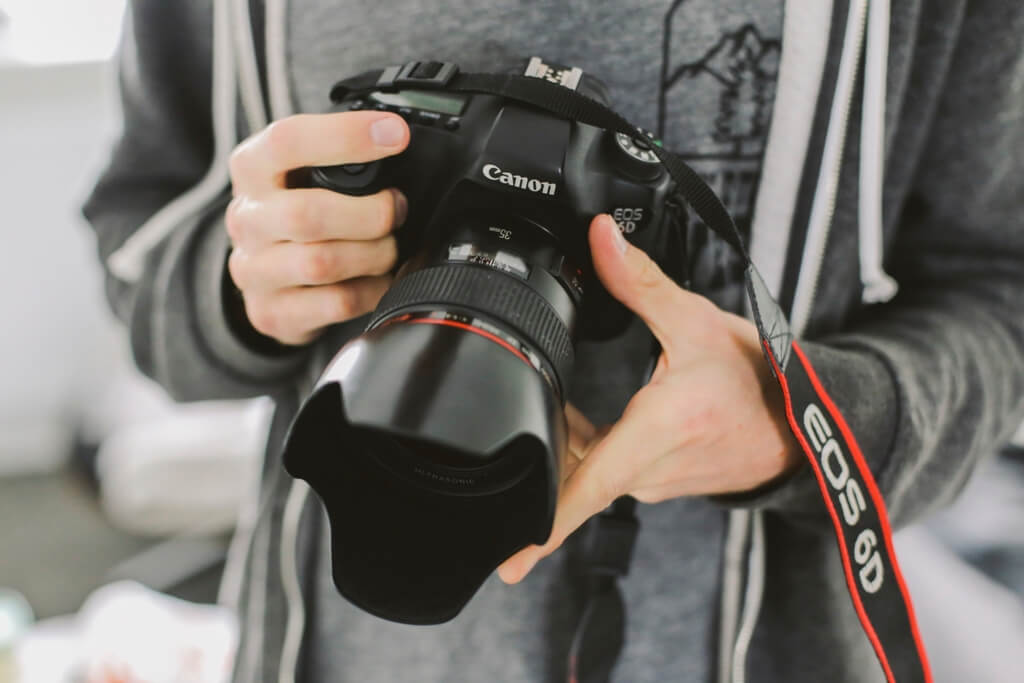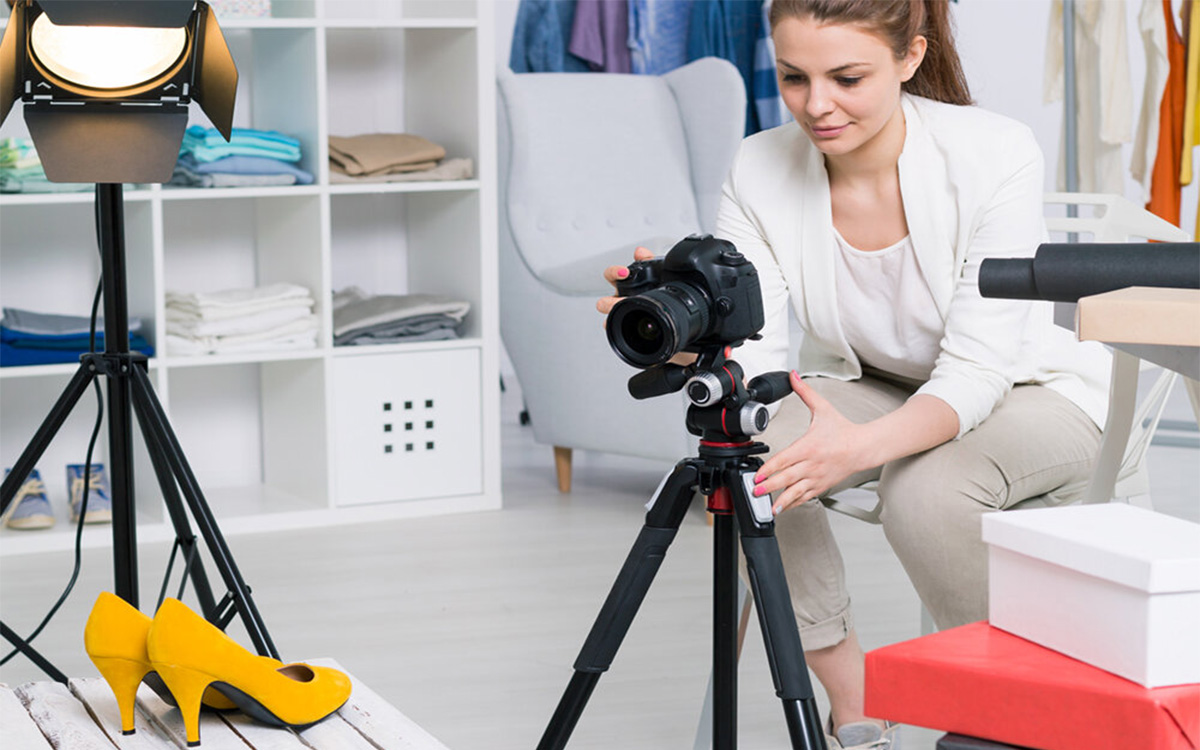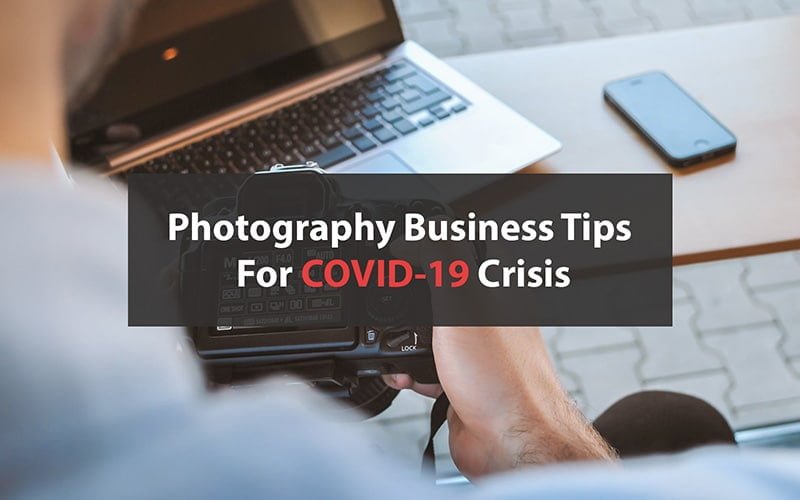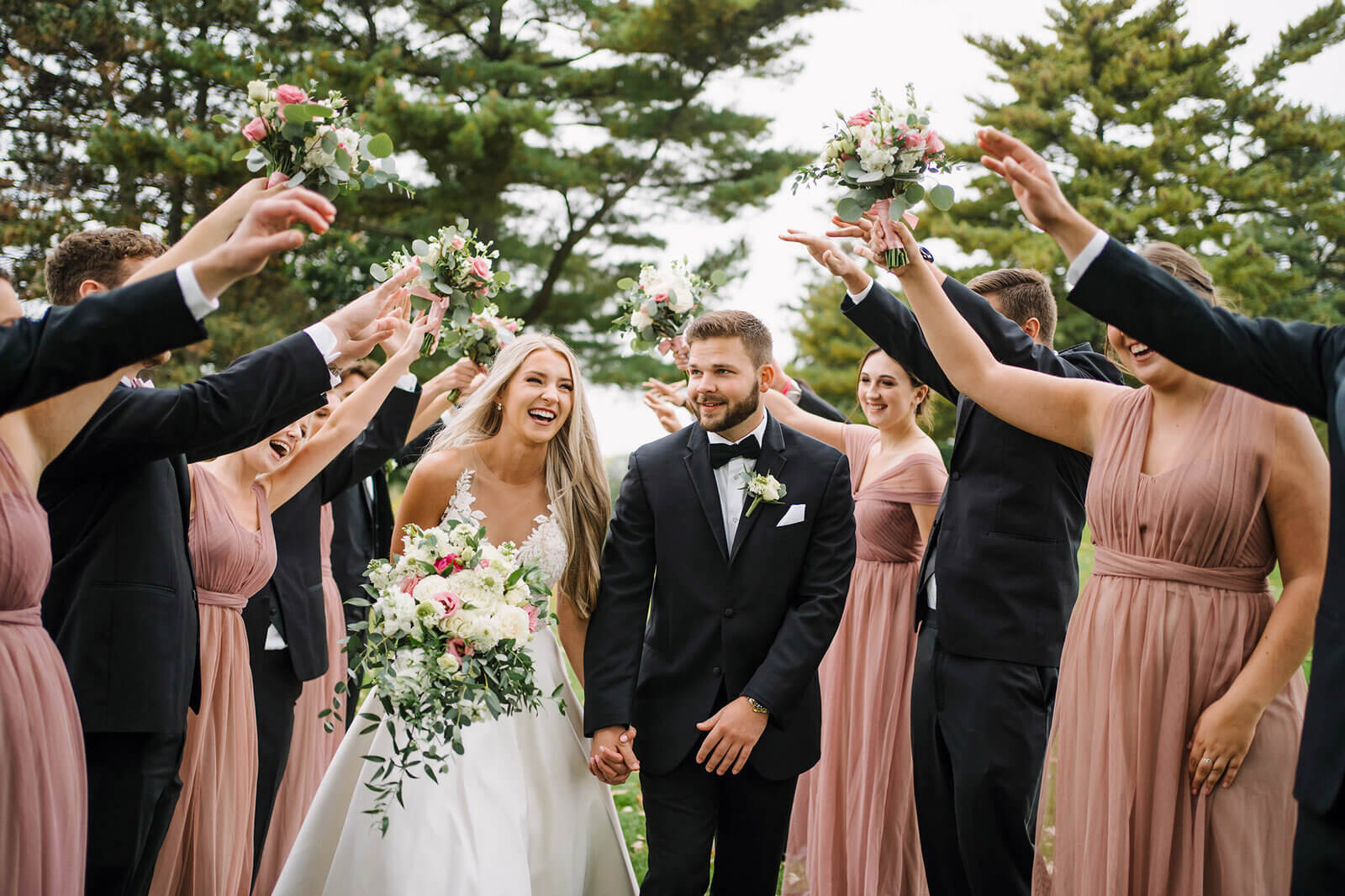When the need is to get a professional grade photography camera, you will have to consider specs like sensor size, aperture, autofocus, pixel size, ISO range, etc. as well as the real life photo shooting experience.
Now, specs will vary in different models depending on exactly what type of photography you will be using the camera for. And the market offers quite capable cameras that are enormous in number.
Herein, this list will help narrowing down your choices to get the best camera for professional photography.
Whether you will be using the camera for professional photo shooting or content creation purposes, the list got cameras for both purposes.
What you’ll learn in this article
- 1 Why Is a DSLR Camera Important to a Professional Photographer?
- 2 Which DSLR Cameras Do Professional Photographers Use?
- 3 Which DSLR Camera Is Best for Professional Photography?
- 4 10 Best DSLR Camera for Professional Photography
- 4.1 1. Canon EOS Rebel T7 DSLR Camera with 18-55mm Lens
- 4.2 2. Canon EOS Rebel T7 DSLR Camera Bundle
- 4.3 3. Nikon D3500 DX-Format DSLR Two Lens Kit
- 4.4 4. Nikon D850 FX-Format Digital SLR Camera
- 4.5 5. Canon EOS Rebel SL3 Digital SLR Camera with EF-S 18-55mm Lens Kit
- 4.6 6. Canon DSLR Camera [EOS 90D] with 18-135 USM Lens
- 4.7 7. Canon EOS Rebel T8i EF-S 18-55mm Lens Kit
- 4.8 8. Nikon D7500 20.9 MP DSLR Camera with AF-s 18-140mm VR Lens
- 4.9 9. Nikon D780 Body
- 4.10 10. Canon EOS 5D Mark IV Full Frame Digital SLR Camera
- 5 How to Choose the Best DSLR Camera for Professional Photography?
- 6 Which DSLR Should You Buy for Yourself?
- 7 Frequently Asked Questions
- 8 Final Words
Why Is a DSLR Camera Important to a Professional Photographer?
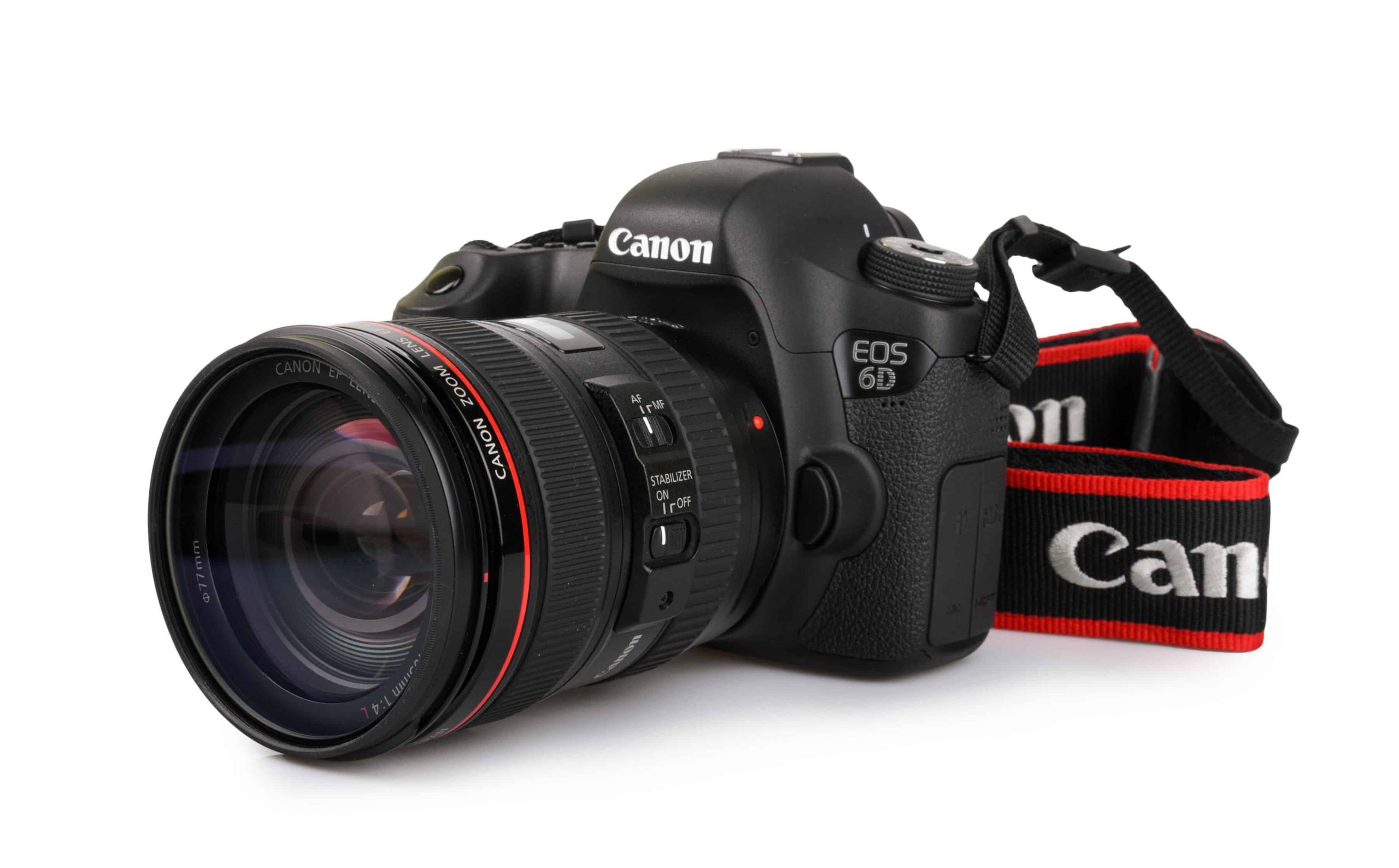
Even though a higher end mirrorless camera captures better photos than most DSLRs, professional photographers still prefer using DSLRs because of well-capable image processing, collection for DSLR lenses, longer battery life, ultimate 4K video recording purposes.
Ergonomics
It seems that even these days professional photographers prefer holding a bulky yet ergonomic DSLR unit than a slim and lightweight mirrorless camera. As they have to hold cameras for hours, ergonomics matters a lot more than lightweight housing.
Interchangeable Lenses
When it comes to professional sports, press, and wildlife photography, professionals highly rely on these cameras. Interchangeable lenses are one of the biggest reasons for that.
To make sure the images look perfect, lenses play a significant role. That’s why many of them prefer a mid-range DSLR over an ultimate mirrorless camera.
Battery Backup
For bulky housing, DSLRs pack larger batteries. That’s what makes these units super popular among professionals as they have to spend hours clicking multiple hundreds of times to get the right picture. Some DSLRs even allow up to 1200 clicks per charge. You are less likely to run out of battery using a DSLR camera outdoors.
Price
Entry-level professionals would always go with DSLR units as these are way cheaper than an entry-level mirrorless camera. The price range is much wider, leaving you with flexible options to choose from.
If you need a basic camera, DSLRs have these, for upgrade, you can opt for a more advanced unit. So, you don’t necessarily mean to spend a fortune to get a decent camera to start your photography profession.
Which DSLR Cameras Do Professional Photographers Use?
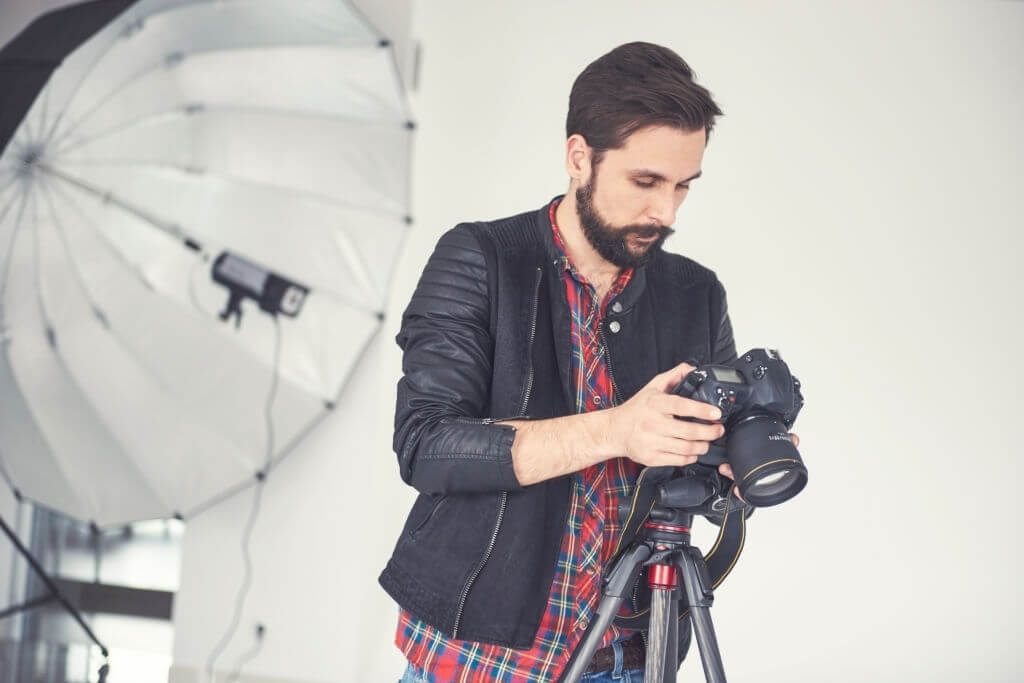
Before getting into specific models, let me tell you what specs and features professionals look for before getting a camera.
Sensor Size
This is the foremost thing that determines the image quality. Larger the sensor, the better images will be captured. Low lighting photography highly depends on it. A larger sensor is a must if you are to get a camera for indoor or night or low-light photography.
Autofocus
The sharpness of objects highly depends on the ability of the autofocus system. If the number of autofocus points are more, the better focus the camera will be able to do on objects.
Another thing is the area coverage. If the coverage is large, the camera can focus more objects into that area.
ISO Range
Typically ISO starts from 100, and it goes all the way up to 25600 or even more. You can adjust the light sensitivity for specific types of photoshoots by tweaking the ISO.
Continuous Shooting Speed
Most professionals prefer at least 7 fps continuous shooting speed to maintain the detail and clarity in image. Don’t go lower than this. This article has multiple cameras that can shoot more than 7 fps.
Videography
More or less all professional cameras can shoot 4K videos at 30p or 24p. If you will be making cinematic videos, make sure the camera can shoot 4K at 24p. Also, consider how fast the camera focuses while video recording.
You will find professionals using Nikon D850, which is a well-rounded camera currently available in the market.
Canon EOS 5D Mark IV is another widely popular camera among pro shooters. For entry-level photographers, Canon EOS Rebel T7 suits the best.
Which DSLR Camera Is Best for Professional Photography?
Professional photo shooters always consider larger pixel size, decent ISO range with less noise, fast and sharp focusing, faster shutter speed, image processor for color accuracy and detail, lens compatibility, weight and balance factor, and durability in DSLR cameras.
But if you are looking for one particular model for professional stuff, Canon EOS 5D Mark IV would be the one.
Its class leading image quality, exceedingly fast autofocus, great low light performance, wider ISO range with relatively less noise, excellent image processor make it one of the best cameras for professional photography. Apart from the specs and features, the camera feels extremely comfortable in hand for its ergonomic build.
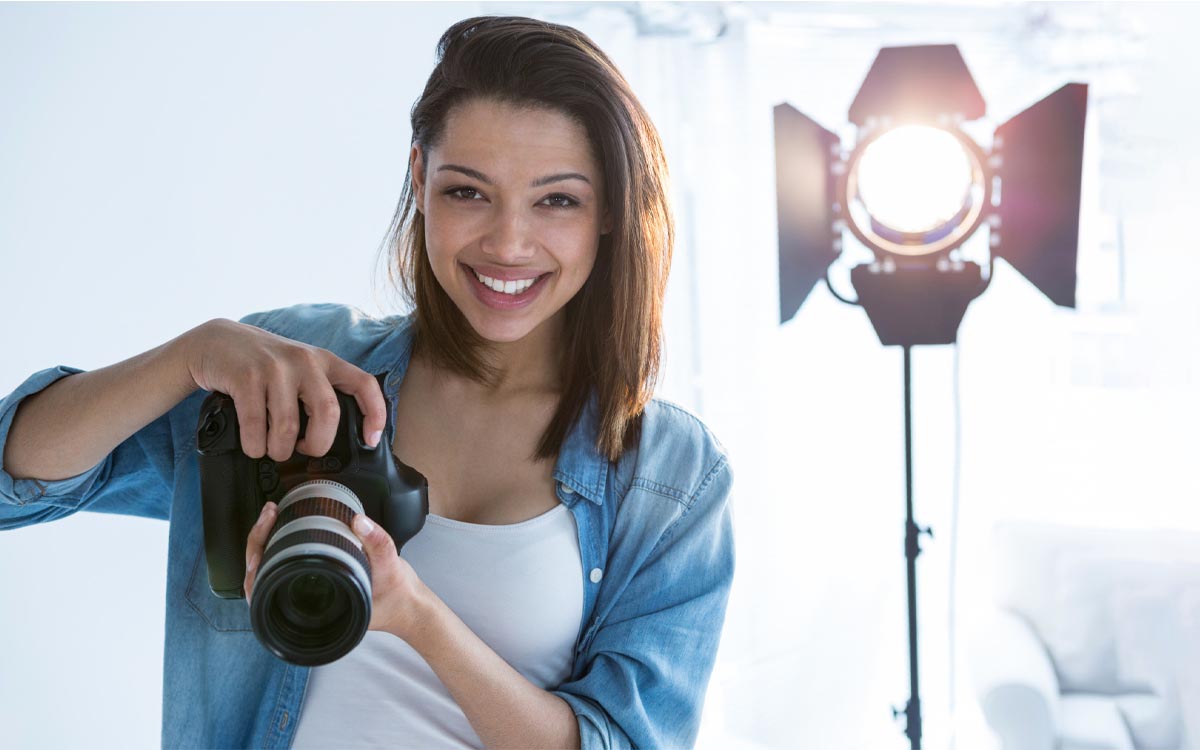
10 Best DSLR Camera for Professional Photography
Apart from camera specs, this list of DSLR cameras was made considering the durability of the housing, weight factor, battery life, and price.
1. Canon EOS Rebel T7 DSLR Camera with 18-55mm Lens
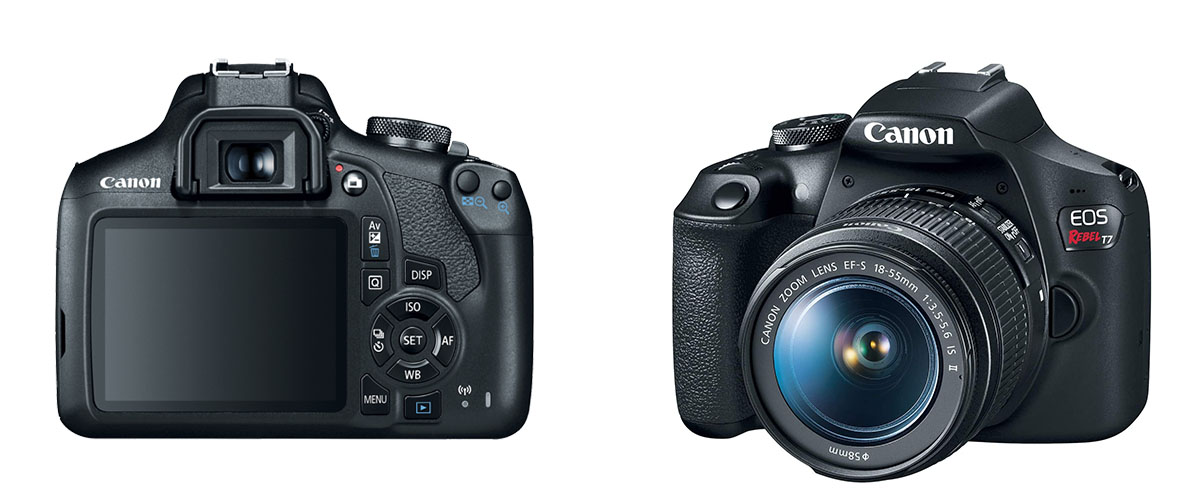
This camera would be a huge upgrade for an entry-level photographer even over a flagship smartphone with the largest image sensor. Colors come great, and detail in images will surely complement your initial photography skills.
Packed with a 24.1 MP sensor, this full frame camera delivers quite more that basic photography needs. The fine detail is excellent in images, and colors look really vivid. Even in low light, there isn’t much noticeable noise in images. Thanks to its Digic 4+ image processor to help with image processing.
With a 9-point autofocus system, you can take superb close shots. However, you might not find it good enough to focus objects that are further away from you. Also, it struggles to continue focusing when recording videos.
You will find the optical viewfinder to be pretty accurate even under direct sun. it allows you to see exactly what the lens observes.
The included 18-55mm lens should be more than enough for most photography needs, specially standard shots and portraits.
When it’s about durability, this low-end camera doesn’t compromise. The housing as well as other parts are well made, and can withstand falls without any issue at all.
Key Features:
- 24.1 full frame megapixels
- Digic 4+ image processor
- 100-6400 ISO range
- 9-point autofocus
- 3 fps continuous shooting speed
- WiFi and NFC for connectivity and data transferring
- 95% optical viewfinder coverage
| Pros | Cons |
| Decent image quality as an entry level DSLR | Not ideal for video shooting |
| Accurate and fast autofocusing for close shots | Autofocus isn’t good for further distance objects |
| Images come colorful with much detail | |
| Beginner friendly auto mode delivers pretty accurate exposure | |
| Durable housing, can withstand falls easily | |
| Lightweight and portable |
2. Canon EOS Rebel T7 DSLR Camera Bundle
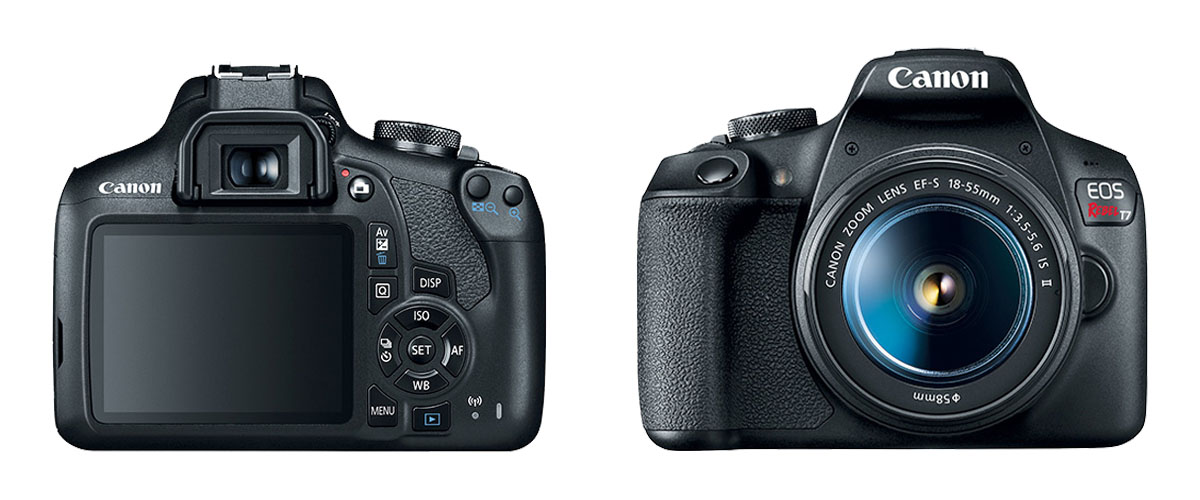
If you are about to get your first DSLR camera, this bundle pack would be worthwhile considering. The deal comes with pretty much everything you will need as a beginner photographer, no need to buy seperate accessories and kits.
The camera itself, Rebel T7 is the best beginner camera for professional photography from Canon. It captures pictures with great detail and excellent color vibrancy.
When taking close shots, its 9-point autofocus system brings excellent quality images. Also, when taking low light or night shots, the sensor manages to get enough light for good looking photos.
The overall image quality is highly twisted by its Digic 4+ image processor. This is the very software that does wonder for your entry-level photography.
It comes with a 18-55mm II lens, which is good enough for portraits as well as telephoto shots.
With f/3.5-5.6 aperture range, you can give images the exact look that you want regardless of the photo taking situation.
The included wideangle lens will easily get you 2.2x zoom for decent quality zoomed pictures.
You will also get 2 pieces of SanDisk 32GB memory card, padded camera case, flash light, additional battery pack, charger, tripod, USB card reader, and other accessories that you will need while going outdoors for photography.
Key Features:
- 21.4 MP image sensor
- 9-point autofocus
- 100-6400 ISO range
- 3 fps continuous shooting
- Digic 4+ image processor
- WiFi and NFC
| Pros | Cons |
| Value for money starter kit for beginners | Struggles with the focus while video shooting |
| Camera takes decent quality images with great detail and color | Has some minor exposure issues |
| Good low light photography quality for the price | |
| Superb close shots for its autofocus | |
| Records 1080p videos |
3. Nikon D3500 DX-Format DSLR Two Lens Kit
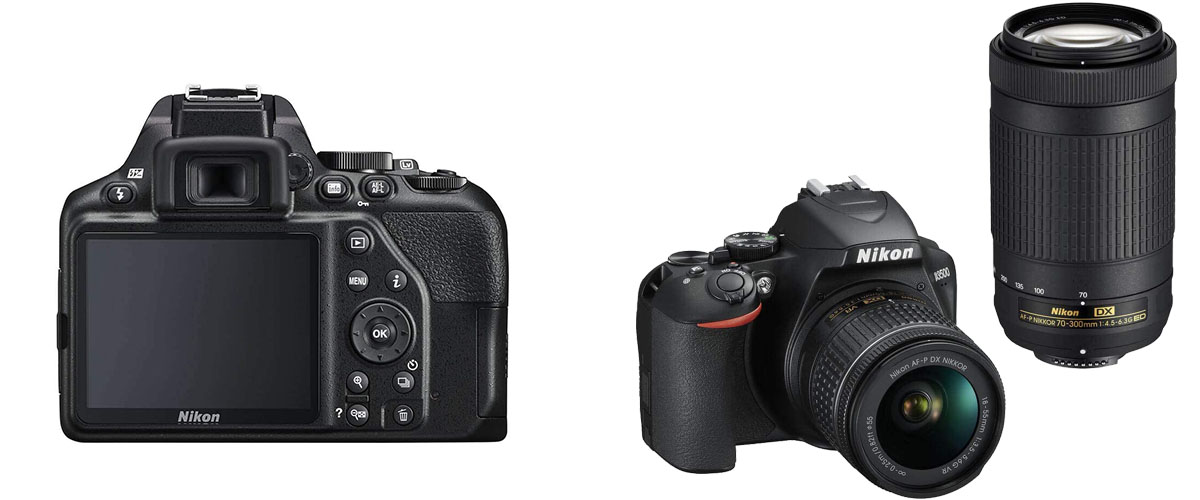
If you want to level up your iPhone or best smartphone camera photography, Nikon D3500 would be the best professional DSLR camera you begin with. The deal includes 2 most widely used lenses to make sure you don’t run out of the right gear for versatile photoshooting needs.
The image sensor is about 15 times larger than typical smartphone camera sensors. You can capture sharper, color enriched, and clearer photos pretty much all the time. Without tweaking much controls and adjustments, the auto mode will be enough for most capturing needs.
With 11-autofocusing points, close shots will come superb using this camera. It also features AF lock to continuously focus moving objects to take good quality action photos.
Compared to the D3400 model, the AWB is much improved in this newer model. So, colors will be much more accurate in photos regardless of the lighting conditions.
The ISO range is 400-3200 with many stops for excellent image quality even in low light and night mode.
With its 5 fps maximum continuous shooting speed, you can capture the best moments at full resolution. The focus will be something you would expect.
The deal includes a 18-55mm telephoto lens with f/3.5-5.6G aperture. It produces decent portrait image quality as well as other wider shots.
There’s also a telephoto zoom lens for you to capture sports, events, and natural photos.
Key Features:
- 11-point AF with AF lock
- 5 fps continuous shooting
- 1080p video recording at 60p
- Improved AWB
- ISO 400-3200 range
- Bluetooth connectivity
| Pros | Cons |
| Great AWB capability captures photos with natural looking colors | No geo-tagging |
| Autofocusing is decent even for a bit long distance objects | No WiFi |
| Images come sharp, vivid with great amount of detail | |
| Overall durable yet lightweight build | |
| ISO manages to get good night mode pictures | |
| Comes with a telephoto and telephoto zoom lens |
4. Nikon D850 FX-Format Digital SLR Camera
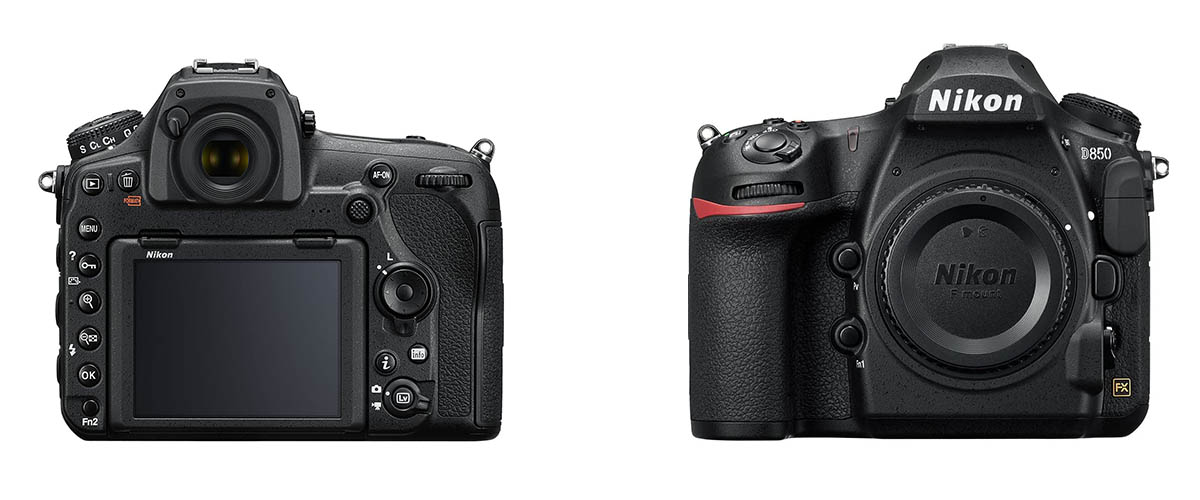
If you are willing for pay for a Nikon SLR camera, or want a solid unit to take breathtaking low light photos, your search ends here.
The camera spots a 45.7 MP sensor that allows a lot of light to enter into the sensor. Photos come colorful with rich detail. Even night time shots have quite less noise than conventional SLR cameras. For those who care about dynamic range a lot, this would be the ideal pick.
Autofocus system in this camera is one of the best in its class. With 153 focus points and 99 cross-type sensors, you won’t notice any lag focusing objects. Even in low light it focuses objects incredibly faster – all credit goes to its -4 EV for this.
When it comes to ISO range, this probably would be the best bet. With an ISO range of 64-25600, your photography skills will be limitless, which makes it the best camera for professional photographers in the list.
You can shoot breathtaking 8K and 4K time lapse videos with a lot of detail and sharpness. For regular video shooting, you can take it up to 4K.
The touch screen on this camera is buttery smooth. You will get an iPhone-like touch response from it.
Shooting outdoors on a sunny day will make sure you can see properly on its electrical viewfinder. It gets a lot brighter compared to most mid-range Nikons. Also, its higher refresh rate would add more to the overall user experience.
Key Features:
- 45.7 MP large sensor
- 9 FPS continuous shooting speed
- 8K time lapse and 4K video recording
- 153-point AF
- 64-25600 ISO range
| Pros | Cons |
| Images come extremely sharp with vivid colors | Struggles to focus in 4K videos |
| Excellent low light focusing ability | No inbody image stabilization |
| Smooth and very responsive touch screen | |
| Screen gets enough bright for outdoor visibility | |
| Image processing is pretty fast |
5. Canon EOS Rebel SL3 Digital SLR Camera with EF-S 18-55mm Lens Kit
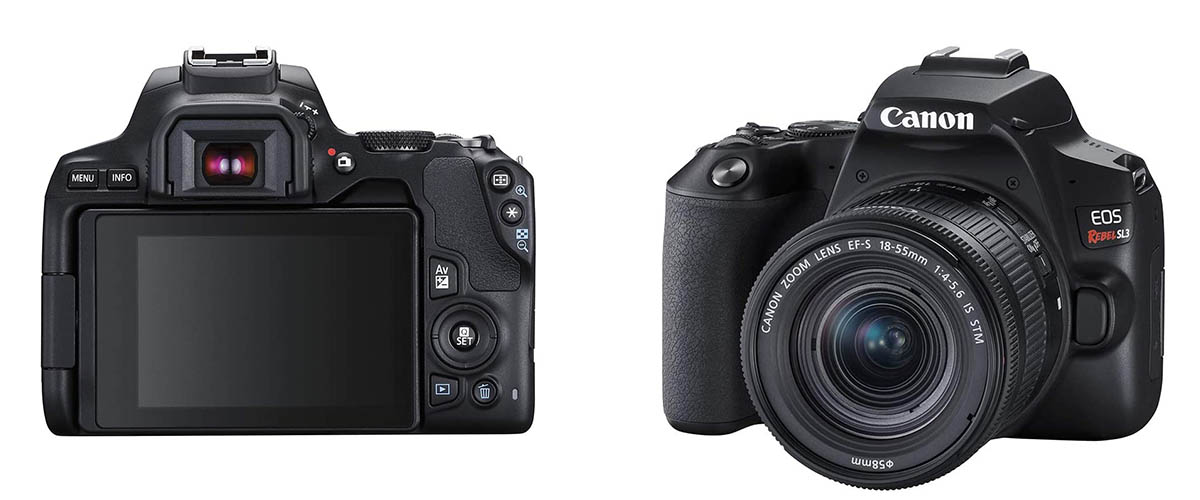
If I was to pick the best camera for professional photography, this one from Canon would definitely be on the wishlist. The camera comes with pretty much everything that you would need to click great looking photos without much adjustments and stuff.
With a powerful 24.1 MP CMOS sensor, your photo capturing experience will encourage you to click more. Images come with fine details and great dynamic range. The overall colors are extremely good for this price.
A good camera for professional photography would always come with a capable autofocus system. Even though it has only a 9-point AF system, its dual pixel CMOS AF makes it up for well-focused captures. If you use compatible EF lenses, it will get you up to 88% horizontal and 100% verdict focusing range.
With max video resolution 4K, you can shoot amazing cinematic as well as time-lapse movies using this small camera.
The best feature of this camera is probably the Digic 8 image processor. It does so well that even in low light it’s capable of producing vivid and colorful photos faster.
If carrying a bulky and weighted DSLR isn’t your thing, its compact and lightweight form factor will be another deciding factor for your convenience.
Key Features:
- 24.1 MP sensor
- ISO 100-25600
- Dual pixel CMOS AF
- Vari-angle touch screen
- Digic 8 image processor
- WiFi and Bluetooth connectivity
| Pros | Cons |
| Photos come colorful, vivid, and with great dynamics | Only 9 focus points |
| Faster image processor even for low light photographs | |
| Consistent AF system with wide coverage | |
| Vari-angle touch screen for selfies and easy operation | |
| Lightweight form factor makes it extremely portable |
6. Canon DSLR Camera [EOS 90D] with 18-135 USM Lens
![Canon DSLR Camera [EOS 90D] with 18-135 USM Lens](https://offshoreclipping.com/wp-content/uploads/2021/12/Canon-DSLR-Camera-EOS-90D-with-18-135-USM-Lens.jpg)
You won’t always need a full frame DSLR to capture great pictures. Canon 90D is one of those cameras for entry-level photography needs, which is capable enough to enhance your photography skills.
The sensor on this one is 32.5 MP. Whether you use it for outdoor photography, events, low light, landscape, etc. purposes, image quality will be quite pleasing. Images come shrap with fine detail even in low light.
For autofocusing, the camera spots a 45-point autofocus system with 88% horizontal and 100% vertical area coverage. So, even if your subject is off-center, it will be well-focused. The focusing speed is pretty fast. When compared to a low-budget mirrorless camera, the speed isn’t much noticeable.
With 10 fps continuous shooting speed, the camera captures action as well as moving things without compromising much in image quality.
You can also shoot 4K videos at 30p, which is suitable for cinematic movies. The overall video quality is more than enough for YouTube content creators.
A huge shoutout for its high speed Digic 8 image processor. Even at high ISO and low lighting conditions, it manages to produce quality images with less noise and grain at a decent pace similar to best pro cameras.
Key Features:
- 32 MP sensor
- 45-point AF system with wide area coverage
- Digic 8 image processor
- 4K video recording at 30p
- 10 fps continuous shooting
| Pros | Cons |
| Great image quality without much grain or noise | Doesn’t come with battery grip |
| Wide and fast autofocus with 45-points | |
| Larger high resolution sensor allows more light to enter | |
| Smooth 4k recording at 30p for content creating purposes | |
| Value for money pick for enthusiasts |
7. Canon EOS Rebel T8i EF-S 18-55mm Lens Kit
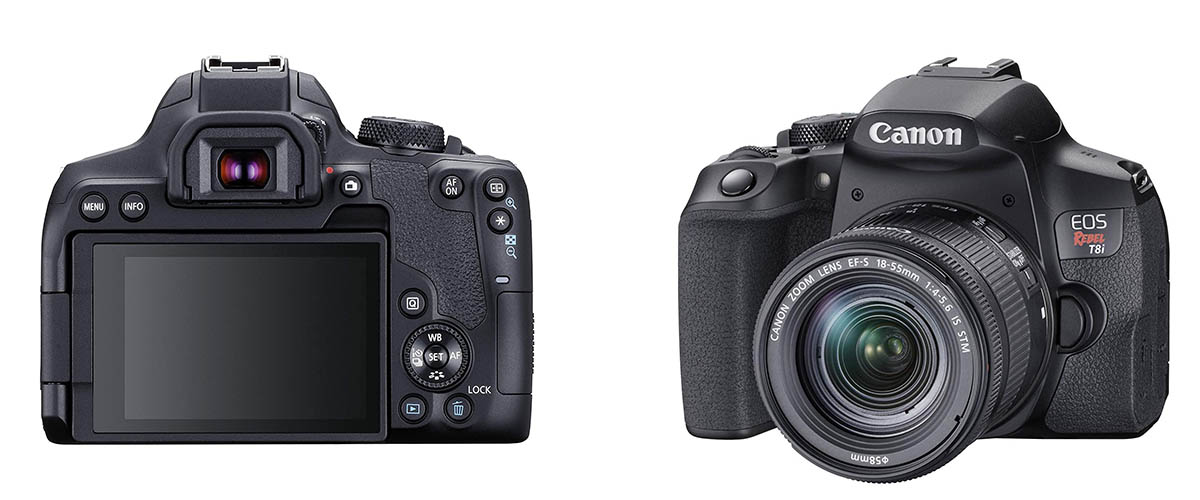
In the digital camera world of enthusiasts, Canon T8i is a popular model. It packs a decently large sensor, wide ISO range, fast AF system, along with other features to make your shooting experience much more convenient and advanced.
From its 24.1 MP CMOS sensor, images come with great color accuracy, sharp, and fine detail. The sharpness in images is something you would see in mirrorless cameras. The Digic 8 image processor makes sure that images are processed at a faster speed while not ruining the image quality.
For video shooters, content creators, as well as cinematic movie creators, this camera offers 4K video recording. You can shoot up to 24p, which is quite better than what the previously reviewed model offers.
When it comes to the autofocus system, it’s no exception than most entry-level DSLR cameras. With 45-point cross-type autofocus, you can make sure objects in the pictures are well focused even when they are moving. This might not have the best AF coverage area, but for beginner level photography, it’s not too bad.
For night mode shooting, it offers ISO range of 100-25600 to take breathtaking photos. Again, that to its powerful image processor as well as focus system to minimize the limitations like noise and stuff to always bring out great quality images.
Even if you already own a couple of professional cameras, as a secondary camera, this unit will be highly beneficial to your shooting adventure.
Key Features:
- 24.1 MP CMOS sensor
- Digic 8 image processor
- Wider ISO range of 100-25600
- 45-point AF system
- 7 fps maximum continuous shooting speed
- Vari-angle LCD
- 4K video at 24p
| Pros | Cons |
| Takes great quality images with its large image sensor | Dynamic range is poor in 4K videos |
| Autofocusing speed is quite fast even in low light | |
| Wider ISO range for limitless possibilities | |
| Can record cinematic 4K videos at 24p | |
| WiFi and Bluetooth file transferring and connectivity options | |
| 7 fps continuous shooting for sports and wildlife captures |
8. Nikon D7500 20.9 MP DSLR Camera with AF-s 18-140mm VR Lens
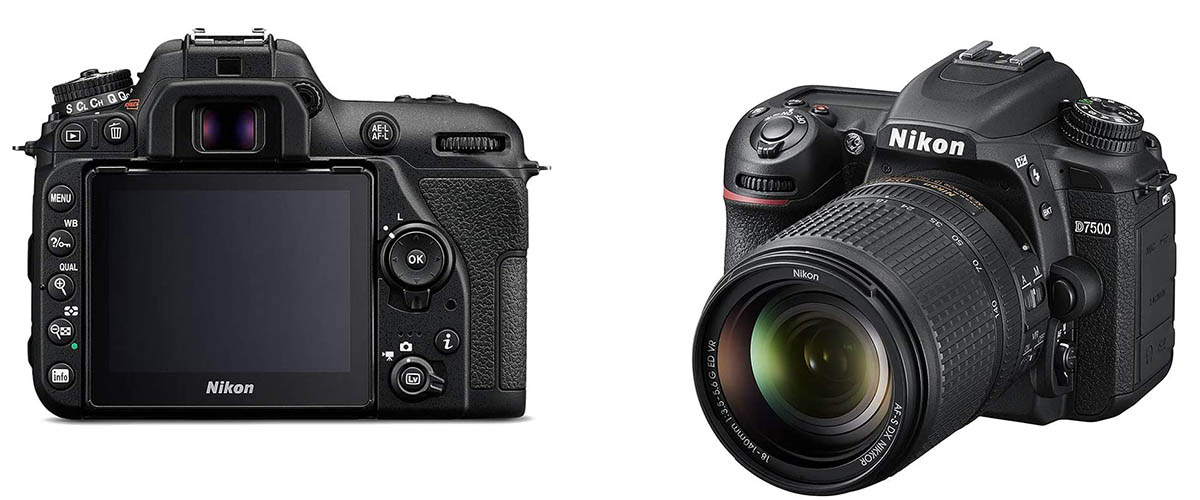
There aren’t too many entry-level DSLR cameras suitable for almost all purpose photography. Well, if you’re looking for one, and can spend a bit more than most entry-level cameras, you don’t regret buying a Nikon D7500 unit. Professionals even recommend mid-level photographers to use it to step ahead in this digital camera world.
Nikon D7500 spots a 20.9 MP DX image sensor with Expeed 5 image processing unit. Photos as well as videos come with great sharpness, ideal color tone, and excellent dynamic range. Even in low light conditions, it produces high quality images, which you can compare with mid-range full frame mirrorless cameras.
Even though a 20 MP sensor might not seem anything overwhelming, the overall performance of this sensor was pretty impressive. Compared to other models, colors were a lot better, with noticeable better ISO performance, which make it one of the best Nikon cameras for professional photography.
With its 51-point autofocus setup, it’s pretty fast at focusing objects. In low light, you won’t notice much delay as well. The focusing coverage area is wider, you won’t miss the focus clicking with this camera unit.
The camera can go up to ISO 6400. So, night mode or low light photography will come great if you know how to get the most of a wide ISO range.
D7500 offers a maximum continuous shooting speed of up to 8 fps for sequential shots. While shooting, the shutter was pretty sensitive.
Key Features:
- 20.9 MP sensor with Expeed 6 image processor
- Up to 6400 ISO range
- 51-point AF, wide coverage area
- 8 fps continuous shooting
- 3.2-inch tilt touchscreen
- Weather sealing housing
- 4K video shooting
| Pros | Cons |
| Sensor and image processor significantly improves image quality | A bit higher price tag |
| Decent low light shooting capability | Can overheat |
| Fast and wide autofocus system performs well even in low light | |
| Can create great looking 4K video regardless of the lighting conditions | |
| Weather sealing body makes it ideal for carrying it on trips |
9. Nikon D780 Body
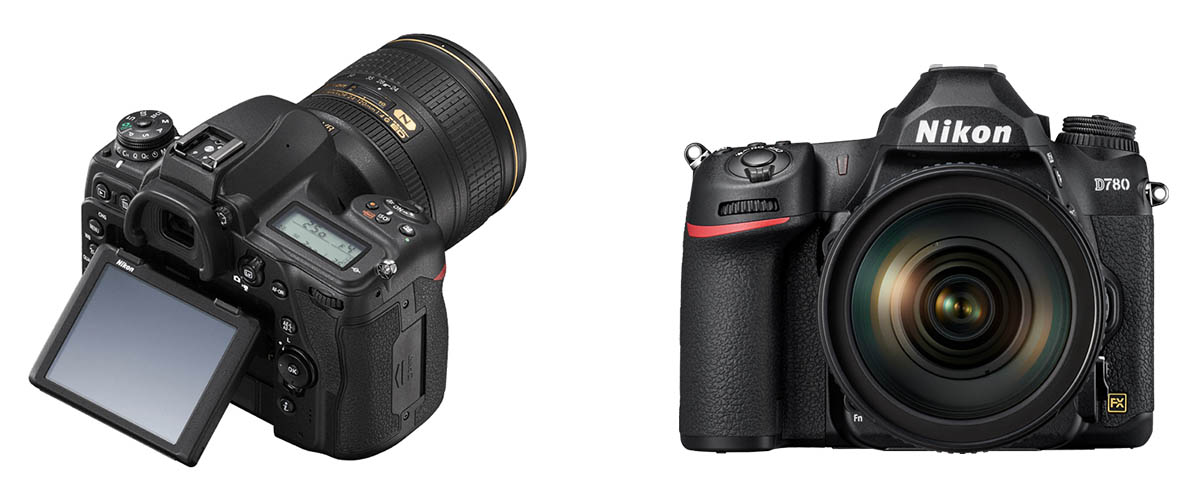
If videography also matters to you along with professional grade photography, Nikon D780 camera won’t disappoint you. The specs and features are pretty identical to higher end cameras. So, if you are to spend for a higher end professional photography camera, this is the one you should keep your eyes on.
The image quality is something you would expect from a higher end and expensive full frame DSLR camera. Thanks to its 24.5 MP large sensor, which is pretty capable of capturing images with high detail and great sharpness.
With up to 51,200 ISO capability, low light performance of this camera is top-notch. Noise is extremely minimal in low light photos.
This impressive camera offers a 51-point AF system with an advanced autofocus algorithm to maintain extremely sharp and accurate focus. Even if you use it for sports photography, results will be quite satisfactory.
You will get the maximum continuous shooting speed of 7 fps from this camera. The photo quality won’t be compromised whatsoever.
4K video shooting is one of the best areas of this professional camera. Videos come ultra-sharp with the ability to shoot cinematic scenes. You can also make breathtaking time-lapse videos using this incredible camera.
The magnesium alloy and carbon fiber materials make the housing extremely well-built and rugged. No matter how harsh the environment is where you will be shooting, you got no reason to worry.
Key Features:
- 51-Point AF system with eye-detection
- Wide ISO range up to 51200
- Expeed 6 image processing engine
- 7 fps continuous shooting speed
- 4K video recording with sharp and great detail
| Pros | Cons |
| Images come extremely good, similar to higher end mirrorless models | No battery grip |
| Great low light photography with much less noise | |
| Fast, accurate, and sharp autofocus, 51-point | |
| Shoots 4K videos at 24 fps for cinematic shooting | |
| Fast and higher end image processing engine | |
| Rugged housing ensures durability |
10. Canon EOS 5D Mark IV Full Frame Digital SLR Camera
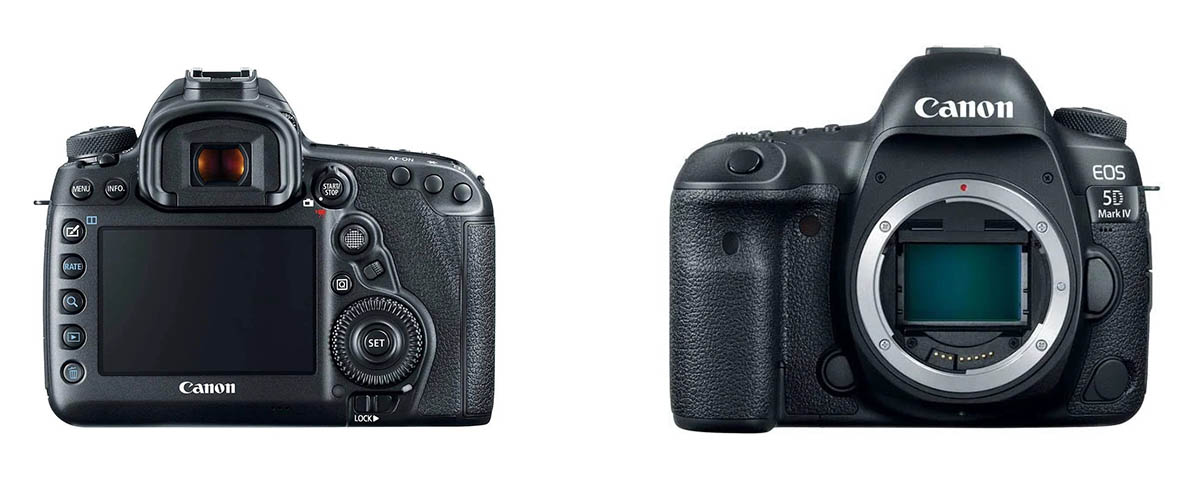
Among professionals, this camera model is quite popular. Compared to higher end models of Canon, 5D Mark IV doesn’t cost that much but still comes with relatively better specs as well as features.
Whether this is the brand that you find more reliable or want an excellent camera that doesn’t cost a fortune, 5D Mark IV would be the best canon camera for professional photography.
This one packs a 30 full frame megapixels sensor to get you excellent image quality when compared to a typical mirrorless camera. If you are to take low light images, the performance will surely impress you without a doubt.
With its high ISO settings of 100-32000, you won’t miss out on options in different conditions for taking great quality images.
The camera offers a max video resolution 4K to make sure your video contents stand out while leaving no room for others. You can shoot 4K video at 30p or 24p. So, yeah cinematic video shooting is possible when you have this unit.
This full frame DSLR camera offers a continuous shooting speed up to 7 fps. Thanks to its Digic 6 Plus image processor that processes images faster, while maintaining the image quality.
For capturing moving animals, birds, or other objects, you will find its 61-point AF to be fast and quite accurate. Images come sharp when compared to any mirrorless camera of its class.
Key Features:
- 30 MP full frame sensor
- 61-point AF system
- ISO 100-32000
- 4K video at 30p and 24p
- 7 fps continuous shooting
- Smooth and responsive touch screen
| Pros | Cons |
| Produces high quality images pretty fast | No HDMI 4K out |
| Colors are accurate, great dynamic range, images are sharp | Average battery life |
| Fast and accuracy autofocus with decent area coverage | |
| Excellent image quality even in low light | |
| One of the best cameras from Canon EOS for entry-level professionals | |
| 4K videos come great, can be used for cinematic purposes too |
How to Choose the Best DSLR Camera for Professional Photography?
If you are someone who digs really deep before buying anything expensive or related to your profession, this buying guide section will surely help you with the purchase. Below are the key factors that you shouldn’t overlook while getting the best professional camera for photography.
Lenses
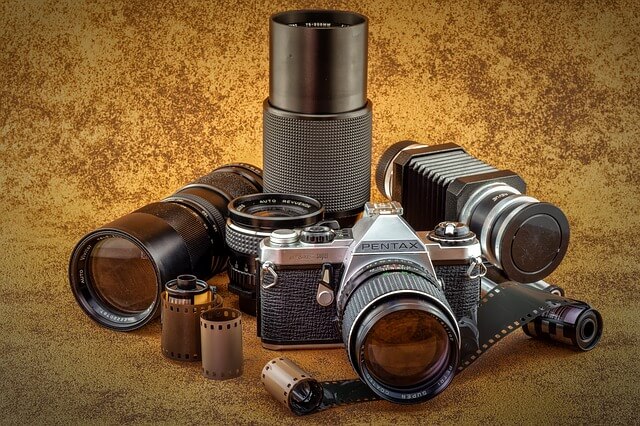
I wouldn’t enlist it if this wasn’t aimed for professionals as well as enthusiasts. For any type of professional photoshoot, the main lens won’t be enough. In many cases, the stock lens won’t allow you to shoot the exact type of photo you’d want.
For wildlife photographers, using a telephoto lens is a must. However, there are different types of telephoto lens for different shooting purposes. If you want to capture birds, sports, or anything that is far away, you would need a super telephoto lens.
If you mostly take photos of products, foods, and insects, you will need a macro lens.
Wide angle and ultra wide angle lenses are for landscape and architecture photography.
You can take portrait, animal, and people photos using the standard lens that comes with the camera.
So, the thing I wanted to make clear is that specific photography requires a specific lens to make the photos stand out among others. Technically, a telephoto lens can take food photos, but the quality won’t be similar when compared to other food images that are captured using a macro lens.
Now that you understand why you would need specific lenses for your professional camera for photoshoot, you will need to consider the brand factor for choosing the ideal lens.
Canon has the most number of lens collections for their DSLR cameras. The second largest collection is of Nikon. Having a huge lens collection is one of the areas where mirrorless cameras lack.
However, Sony also has lenses for SLR cameras, but the numbers are pretty low compared to former manufacturers. They are more focused on making lenses for mirrorless cameras.
Depth of Field
Depending on the type of your photography, you will need to change the depth of field. If you aren’t familiar with this term, it refers to the distance between the nearest and furthest objects in your focused image. So, it’s related to the focusing ability of your camera, which is something really important for professional photographers.
There are 3 things that affect depth of field, which you need to understand first:
Aperture
This particular spec will decide whether the images will have a shallow depth of field or wider DOF. Smaller the aperture number, shallower the DOF. Oppositely, the larger the aperture number, the wider the DOF.
Distance
DOF highly varies on the distance from the lens to the shooting object. If you capture the image from a short distance, the DOF will be shallow. Capturing from a further distance will get you a wider DOF.
Focal length
This is another factor that affects the depth of field. If you shoot with a 16mm lens, the DOF will be pretty wide. Shooting with a 101mm lens will get you a shallower DOF.
So, you will have to consider the requirements of images to get the perfect depth of field.
Shutter and Focus Speed
If you will be doing a lot of night or low light photography, having a wider shutter speed range will actually improve the image quality. Best DSLR cameras have much better shutter speed than typical point-and-shoot cameras. That’s why low light photos come a lot better when using a DSLR.
Breathtaking milky-way photography requires a low shutter speed to allow the light to enter into the sensor for a longer period of time. If you have any specific shutter speed need depending on your type of photoshoots, be sure to get a camera that comes with the specs.
Also, the sharpness of the images will depend on how well your camera can focus on objects. More or less, all
Full Control Over the digital cameras can focus really fast when it’s day time. But only the best DSLR cameras can focus fast in low lighting conditions while producing much less noise for image quality.
Better Image Quality
Image quality depends on a number of factors. Sensor size, aperture, pixel size, ISO range, focusing speed, etc., are the primary factors affecting image quality. For professional photoshoots, also make sure the camera has a powerful image processor to get you color-enriched and sharp images without taking too much time.
Brand Loyalty
When it comes to brands, it’s all about preference. Some folks prefer Canon EOS series, whereas others prefer Nikon to be a bit less pricey than Canon. People also prefer to use a Sony mirrorless camera for the compact form factor. Mirrorless rivals are doing great compared to DSLRs these days.
End of the day, image quality and shooting convenience matter. If you find a specific manufacturer or brand more reliable, consider if that very brand has the lenses you will be using for your type of photography. Otherwise, brand preference won’t add any value to your professional photography.
Which DSLR Should You Buy for Yourself?
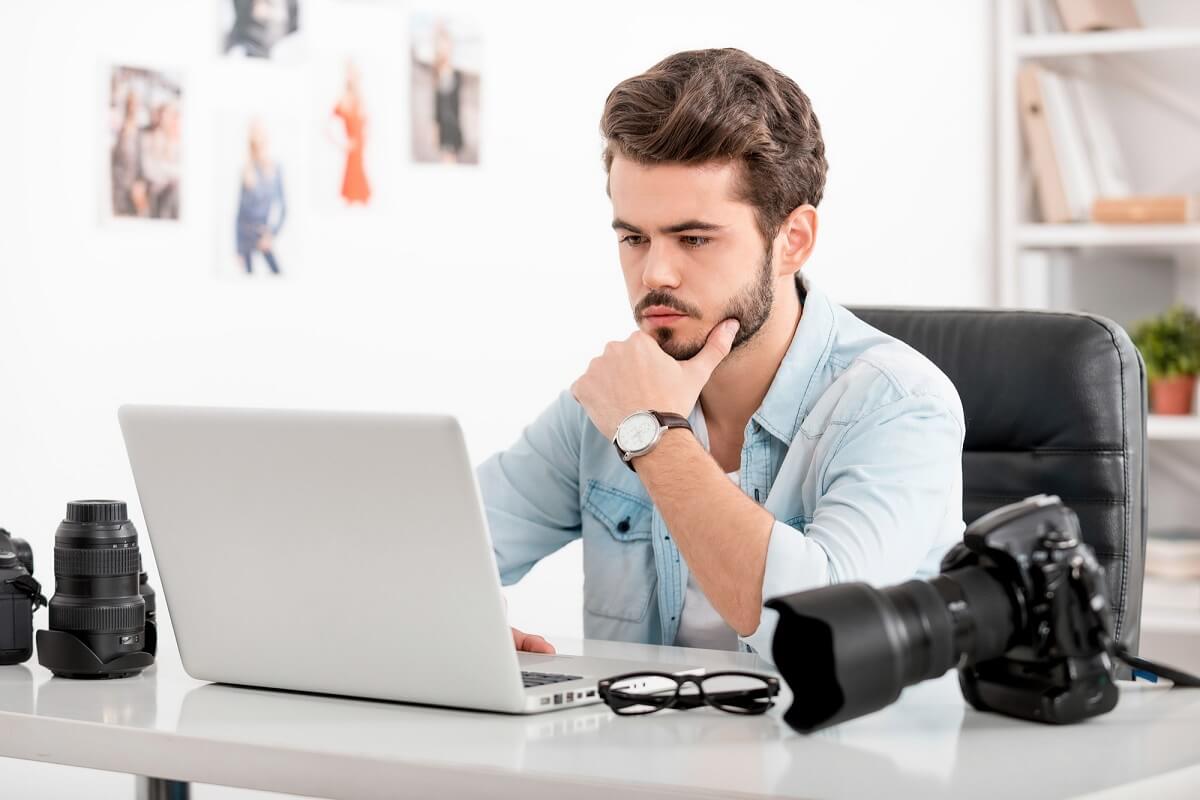
As I mostly take street photography and also landscape, it would prefer a camera with at least 20 MP sensor, having a fast focusing speed with decent area coverage. Also, less noisey wider ISO range (I do low light photography from time to time), max video resolution 4K, and with a durable housing will be the deciding factors.
For me, Canon DSLR EOS 90D would be the value for money pick. I don’t want to spend on a higher end camera, nor do I want to compromise image quality. A standard and a telephoto lens would be more than enough when it comes to a lens.
The included 18-55 lens is okayish for average photography needs. However, the camera itself is compatible with a wide number of Canon Lens. So, from a versatile perspective, the deal sounds decent.
Its large 32.5 MP sensor is one of the biggest selling points of this camera. It manages to gather enough light to produce sharp and colorful images with a lot of detail and dynamic range. Even for low-light photography, it doesn’t disappoint at all.
I’m not interested in cinematic videos, so its max video resolution 4K at 30p would be more than enough. Videos come excellent in different conditions.
Compared to higher-end cameras, its 45-point AF system seems almost nothing. But still, for my requirements, it will do a decent job focusing faster to bring sharp and well-focused images.
Frequently Asked Questions
What is a DSLR camera?
Technically, DSLR comes under the digital camera category, but the full form stands for Digital Single-Lens Reflex Camera. Unlike typical digital cameras, you can change the lens in DSLRs.
Which is better SLR or DSLR?
Even though these cameras reflect light when the light enters through the lens, they differ in how images are captured. SLR cameras use a plastic and gelatin made film to capture images. Whereas DSLRs capture images digitally on a memory card. DSLR cameras are way better than typical SLR cameras.
Which DSLR is best for beginners?
Canon EOS Rebel T7 camera would be the best DSLR for beginners as it can capture great looking images and videos without requiring much adjustments from users. Also, the price is relatively lower than others.
Which DSLR is best at a low price?
In terms of price Canon EOS Rebel 7 would be the best pick. However, if you want images to come even better than entry-level photography, Nikon D850 would be worth it.
What Nikon Camera do professional photographers use?
Professional photographers, as well as enthusiasts widely, use both Nikon D850 and D780 cameras. If you don’t have any budget issues, go for the D850 model. It got a more powerful autofocus system than its counterpart.
How many Megapixels is good for a DSLR camera?
Best DSLR cameras come with at least 20 MP. Even though sensor size matters more than full-frame megapixels, you still shouldn’t go below 20 MP. Keep in mind, full-frame cameras with 20 MP with larger sensor sizes are better than 25 MP photo shoot cameras with a relatively smaller sensor size.
Which Canon camera is best for professional photography?
Canon EOS 5D Mark IV is still a worthwhile choice among professionals rather than an over-expensive mirrorless camera. This particular model got a pretty large sensor, wider ISO range, 4K video shooting, 7 fps continuous shooting speed, high-performing image processor to make sure your clicks stand out, among others.
Final Words
It’s really hard to identify one particular model as the best for professional photography as the requirements are quite different for different photography needs. If you are a portrait photographer, pixel size will matter a lot. For wildlife photographers, the ability to zoom without creating much noise would be the key.
But pretty much all professional stuff would require a camera with faster autofocus, faster shutter speed, larger sensor, wider ISO range with less noise, ergonomic body, and durable build.
So, which one did you find as the best DSLR camera for professional photography, and what are the reasons behind it? Let us know in the comment section.
